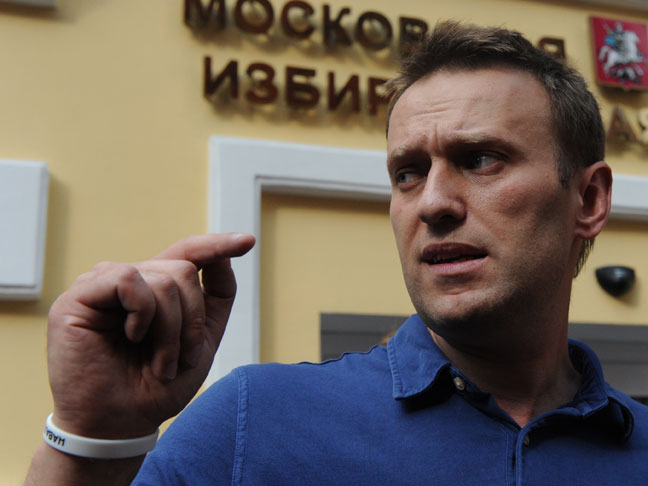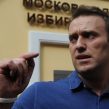
Navalny Becomes Only Real Thing in Fake Russian Politics
Publication: Eurasia Daily Monitor Volume: 10 Issue: 134
By:

A hot and lazy summer in Moscow has turned into a feverish political season last week by the torrent of breaking news—all of them created by Alexei Navalny, who has grown to a towering political figure that scares President Vladimir Putin’s subordinates and leaves far behind the motley crowd of pseudo-leaders of the disunited opposition. On Wednesday, July 17, Navalny officially registered as a candidate in the Moscow mayoral election, thus turning it into a meaningful contest (Moskovsky Komsomolets, July 15). But on Thursday, July 18, the court in provincial Kirov found him guilty of business fraud and issued an extremely harsh sentence of five years in prison, condemning also his associate, Petr Ofitserov, to four years (https://ria.ru/incidents/20130718/950539777.html). That Friday, the court—responding to an improbable motion from the prosecution—overturned its decision to put Navalny and Ofitserov in jail and released them until the verdict is confirmed by the appeals court (https://www.gazeta.ru/politics/2013/07/18_a_5441017.shtml).
The demonstratively severe verdict had been expected but still came as a shock for many observers and political actors, who had cherished the hope that the authorities would see the benefit of preserving a semblance of semi-democracy (Vedomosti, July 19). The sudden change of supreme orders to the obedient court was an encouraging surprise, which clearly goes against the logic of the adopted strategy of deterrence by punishment (https://newtimes.ru/articles/detail/69386/). The protest rally in the very center of Moscow on the evening of July 18 was noticeable but not numerous enough to cause tremors in the Kremlin (https://ej.ru/?a=note&id=13116). Whereas, the sharp drop on the Moscow stock exchange at the moment the verdict was announced was remarkable but did not set a strong trend (Rossiiskaya Gazeta, July 18). The “deep disappointment” expressed by United States Ambassador Michael McFaul about the “apparent political motivations” in the trial and the protestations in the European Union were probably sharper than the Russian foreign ministry expected but still could only amount to a part of the explanation of the uncharacteristic clemency (https://www.newsru.com/world/18jul2013/navalwest.html).
Quite probably, the political intrigue around the elections in Moscow scheduled for September 8 pertains directly to Navalny’s release and return, which saw not only the deployment of a full OMON (special riot police) battalion but also an evacuation of hundreds of his supporters from the Yaroslavsky railway station because a “suspicious object” was allegedly detected (https://www.besttoday.ru/subjects/1412.html). Acting Mayor Sergei Sobyanin has performed above expectations since his appointment in October 2010, and he has reasons to count on a solid victory as opinion polls give him 60–50 percent of the expected vote (https://www.levada.ru/17-07-2013/moskva-nakanune-vyborov-mera-polnoe-issledovanie). He is one of the heavyweights in Putin’s court, and fellow political elites presumably would not want him to strengthen his hand by a confident victory in clean elections (https://www.polit.ru/article/2013/07/19/gladiators/). It stands to reason, therefore, that Sobyanin would insist on granting Navalny an opportunity to partake in the election, expecting to consolidate his own legitimacy. The unexpected problem is that the blatantly unjust verdict has given Navalny such a massive boost in popularity, he now has a fighting chance to win the elections—thus destroying all the Kremlin’s plans (https://tvrain.ru/articles/aleksej_levinson_sotsiolog_levada_tsentra_objatija_navalnogo_na_fone_razvoda_putina_proizvodjat_bolshoe_vpechatlenie-348385/).
Another part of the explanation is the recognition by those in Putin’s court who are not entirely preoccupied with catering to their leader’s whims, the risk of making Navalny into a charismatic and revolution-minded leader of the opposition (Nezavisimaya Gazeta, July 19). Putin may have seen the case as a personal vendetta similar to the persecution of Mikhail Khodorkovsky ten years ago and so ordered to throw the blogger, who had branded the United Russia as the “party of swindlers and thieves,” behind bars (Novaya Gazeta, July 18). The significant difference in the eyes of the average Muscovite, however, is that Khodorkovsky is seen as a billionaire who had gained his fortune by questionable means, while Navalny is a self-made man who stands tall for the interests of common people.
Sobyanin apparently gathered a gang of shrewd courtiers to persuade Putin that the siloviki had pushed the “fear factor” too far and its impact was lost on the crowd that gathered right outside the Kremlin wall (https://www.colta.ru/docs/28275). They are right in arguing that Navalny in jail has a powerful appeal to the Internet-savvy young generation as well as to the old intelligentsia, which values personal dignity above political correctness, and to nationalists who need a champion for their “No more feeding the Caucasus” cause. They are yet to discover that cutting Navalny half-loose does not diminish this appeal—but proves the weakness of the “firm hand” (https://lenta.ru/columns/2013/07/18/saprykin/).
In this “lose-lose” situation, the sharp statement from the White House and European capitals could have finally tilted the circumstances in Navalny’s favor. Putin really wants to have a smooth G20 summit in St. Petersburg in early September, and the possibility that US President Barack Obama might cancel the agreed visit to Moscow upsets him more than he wants to admit (https://www.newsru.com/russia/19jul2013/obamasnow.html). The irony of this ambition to play host to world leaders is in the fact that the G20 is focusing this year on tax evasion and money laundering—and Putin is on thin ice presiding over such proceedings (https://www.ej.ru/?a=note&id=13110). Navalny, to the contrary, works hard on exactly this agenda—and published last week an extensive investigation of the secret business empire of Vladimir Yakunin, one of Putin’s closest friends (https://www.polit.ru/article/2013/07/17/al170713/).
Navalny will certainly be fighting an uphill political battle, but he is now able to attract supporters who find joy in overcoming impossible odds. He can count on two crucial advantages: The first one is that even those Russians who cling to the fast-eroding notion of “stability” are quite tired of the vain and vindictive Putin and his corrupt camarilla and will not lift a finger when some trusted lieutenants decide to retire the boss. The second is that the policymaking in the Kremlin becomes more chaotic as the sole “strategic” goal of preserving the ruling regime requires the execution of increasingly harsher repressions—and most of the beneficiaries of “mature Putinism” are not ready for that. The Kremlin court has mastered the skills of playing pseudo-politics and manipulating a quasi-opposition of different persuasions; but when it comes to facing real political forces, it is completely lost.




